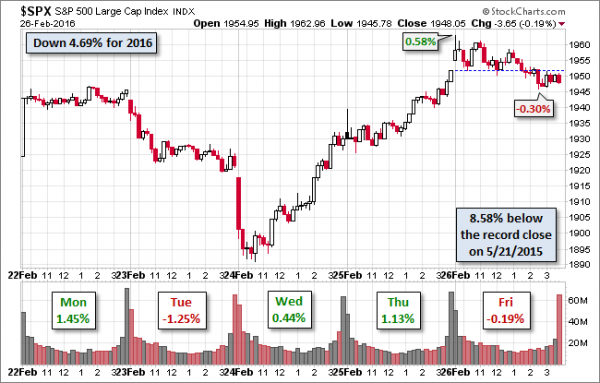This week’s economic calendar is loaded with all of the most important data. In addition, Super Tuesday might provide a defining event to the political campaign. Oil remains volatile, and Fed Speakers are on the loose. Despite the political stories, I expect the punditry to be asking:
Can the strengthening U.S. economy support the rebound in stocks?
Prior Theme Recap
In my last WTWA (two weeks ago) I predicted a focus on the biggest market worries. That guess was not very successful, since the market immediately began a nice, two-week rally. The list of topics was still good preparation, since stories quickly turned to “what could derail the rally?” As Doug Short notes, Friday’s market did not respond even when “an avalanche of economic data surprised to the upside”. Once again, a modest decline in oil prices accompanied a modest decline in stocks. You can see the story in Doug Short’s weekly chart. (With the ever-increasing effects from foreign markets, you should also add Doug’s weekly chart to your reading list).

Doug’s update also provides multi-year context. See his weekly chart for more excellent charts and analysis.
We would all like to know the direction of the market in advance. Good luck with that! Second best is planning what to look for and how to react. That is the purpose of considering possible themes for the week ahead. You can make your own predictions in the comments.
This Week’s Theme
Earnings season continues, and the political stories will be dominant, at least through Tuesday’s elections and Wednesday morning’s news. In a non-political season, this week would be all about the economy. We have more of the important reports squeezed into a single week (helped by Leap Year?) than we have seen in many months.
Recent economic news suggests improvement, at least in the U.S. At some point, a better economy will lead to better earnings and more support for stock prices. By the end of the week I expect politics to be a sideshow with focus on the economic data. Market observers and pundits will be asking:
Can economic improvement provide a foundation for equity markets?
Background
Are first quarters a “one off” over the last few years? Brian Gilmartin writes:
Has anyone else noticed how volatile the first quarter has been the last 3 years ?
In 2014, it was Russia driving tanks into Ukraine, the Venezuelan devaluation and profit-taking after the 32% increase in the SP in 2013.
In 2015, it was falling crude oil, falling commodities, West Coast Port slowdown, strong dollar and even weather in February ’15.
In 2016, the volatility is the result of Financial stock volatility, European bank worries, negative interest rates, etc.
Not one of the last three Q1’s seems to be driven at all by the US economy and worries therein. Jobless claims remain strong.
So what gives? What is it with the first quarter every year?
I don’t know, but it is always something.
Viewpoints
I expect the following to be the principal positions, with the usual vigorous support for each, ranging from bearish to bullish.
As always, I have my own opinion in the conclusion. But first, let us do our regular update of the last week’s news and data. Readers, especially those new to this series, will benefit from reading the background information.
Last Week’s Data
Each week I break down events into good and bad. Often there is “ugly” and on rare occasion something really good. My working definition of “good” has two components:
The Good
On balance the news was very good last week, despite the market reaction.











Leave A Comment